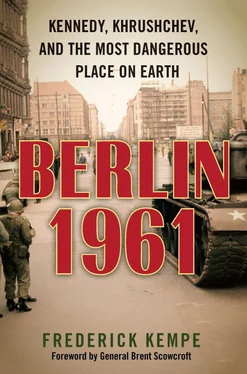The Soviet ambassador in East Berlin, Mikhail Pervukhin, complained to Khrushchev and Foreign Minister Gromyko that Ulbricht was disregarding Kremlin directives with ever greater frequency. A second secretary in the Soviet embassy, A. P. Kazennov, cabled his bosses in Moscow a warning that the East Germans might shut down travel across the border altogether to stop the increased refugee flow. Pervukhin reported to Moscow that a host of Ulbricht measures limiting movement and economic interaction between the two parts of the city had demonstrated the East German leader’s “inflexibility.”
Ulbricht had created a new National Defense Council to better defend his country’s security, and he had named himself to chair it. On October 19, the new council discussed potential measures to seal the Berlin border through which so many refugees were flowing. Though the West considered Ulbricht a Soviet puppet, it was increasingly the East German leader who was trying to pull Moscow’s strings.
In his most recent letter on November 22, Ulbricht had complained to Khrushchev that the Soviets were sitting on their hands while his economy was crumbling, refugees were fleeing, West Berlin freedom was becoming an international cause célèbre, and West Berlin factories were supplying the West German defense industry. He told Khrushchev that Moscow must change course “after years of tolerating an unclear situation.” Waiting to act on Berlin until after Khrushchev could organize a summit with Kennedy, Ulbricht argued, simply played into American hands.
Khrushchev assured a skeptical Ulbricht that he would force the Berlin issue early in the Kennedy administration. What he wanted was not another four-power summit, he said, but a one-on-one meeting with Kennedy where he could more effectively achieve his ends. He told Ulbricht he would resort to another ultimatum at an early stage if Kennedy showed no willingness to negotiate a reasonable agreement in the first months of his administration.
Though Ulbricht remained distrustful, he was heartened by Khrushchev’s declaration of determination to force the Berlin issue so early. At the same time, the East German leader warned Khrushchev that his repeated promises of action on Berlin were losing credibility. “Among our population,” he told Khrushchev, “there is already a mood taking shape where they say, ‘You [Khrushchev] only talk about a peace treaty, but don’t do anything about it.’ We have to be careful.” The East German client was lecturing his Soviet master.
Ulbricht wanted Khrushchev to know that time was running out. “The situation in Berlin has become complicated, not in our favor,” he said. He told Khrushchev that West Berlin’s economy was rapidly growing stronger, illustrated by the fact that some 50,000 East Berliners crossed the border each day to work for the West’s higher wages. The tension in the city was growing in rough proportion to the widening gap in living standards between East and West.
“We still have not taken corresponding countermeasures,” Ulbricht complained. He said he was also losing the battle for the minds of the intelligentsia, a great number of whom were leaving as refugees. Ulbricht told Khrushchev he couldn’t compete because West Berlin teachers earned some 200 to 300 marks more a month than teachers in the East, and doctors earned twice the Eastern salaries. He didn’t have the means to match such salaries, and lacked the ability to produce sufficient consumer goods—even if he could provide East Germans with the money to buy them.
Khrushchev promised Ulbricht further economic assistance.
The Soviet leader shrugged. Perhaps he would have to put Soviet rockets on military alert as he maneuvered to alter Berlin’s status, but he was confident the West would not start a war over the city’s freedom. “Luckily, our adversaries still haven’t gone crazy; they still think and their nerves still aren’t bad.” If Kennedy would not negotiate, Khrushchev told Ulbricht, he would move forward unilaterally, “and let them see their defeat.”
With an exasperated sigh, Khrushchev told Ulbricht, “We must be finished with this situation sometime.”
3
KENNEDY: A PRESIDENT’S EDUCATION
We can live with the status quo in Berlin but can take no real initiative to change it for the better. To a greater or lesser degree, the Soviets and East Germans can, whenever they are willing to assume the political consequences, change it for the worse.
Martin Hillenbrand, State Department chief of German affairs, transition memo to President Kennedy, January 1961
So let us begin anew, remembering on both sides that civility is not a sign of weakness, and sincerity is always subject to proof.
President Kennedy, inaugural address, January 20, 1961
OVAL OFFICE, THE WHITE HOUSE, WASHINGTON, D.C.
THURSDAY MORNING, JANUARY 19, 1961
The oldest president in U.S. history reckoned it was time to introduce the youngest man ever elected to the office to the most fearsome part of the job. It was Inauguration Eve, and in less than twenty-four hours, President Dwight D. Eisenhower, age seventy, would hand off America’s nuclear football to Senator John F. Kennedy, age forty-three, transferring to him the most destructive capability any single country had ever possessed.
And he would have it at a time when Eisenhower feared that miscalculation over numerous U.S.–Soviet flashpoints around the world, the most sensitive of them all being Berlin, could trigger a nuclear exchange. So Eisenhower planned to take Kennedy aside for a private chat on how such a war would be conducted, a session he would close with a memorable bit of show-and-tell using the paraphernalia of the world’s most powerful individual.
Eisenhower worried about Kennedy’s readiness for such responsibility. Among friends, he dismissed Kennedy as “Little Boy Blue” or “that young whippersnapper” when he wasn’t mocking him as “that young genius.” As Supreme Commander of all Allied forces in Europe during the last two years of World War II, Eisenhower had overseen the invasion and occupation of France and Germany. As a Navy lieutenant, Kennedy had piloted nothing more significant than a PT boat, a torpedo-bearing vessel so small that its squadrons were called “mosquito fleets.”
It was true; Kennedy had been decorated as a war hero after saving the lives of eleven crew members, but only after he had inexplicably allowed his PT-109 to be rammed by a lumbering Japanese destroyer. Eisenhower’s military friends didn’t buy the “dark-of-night, fog-of-war” explanation, and instead suspected Kennedy of negligence, though he was spared an investigation.
Eisenhower doubted young Kennedy ever would have achieved the presidency without his father Joe’s deep pockets and insatiable parental ambition. During the war, Joe Sr. had tasked his cousin Joe Kane, a Boston political insider, to game the electoral viability of both his eldest son Joe and Jack. It also was his father who placed the story of Jack’s bravery with author and family friend John Hersey. Its publication in Reader’s Digest and then the New Yorker helped launch Jack’s political career. A year after Jack’s anointment as a hero, Joe Jr. died in action while piloting an experimental, high-risk bombing mission. He was supposed to have ejected from an explosive-laden B-24 Liberator before the plane, now a guided missile, continued by remote control toward a German V-bomb base—but it detonated prematurely. Those who knew the family best wondered if his death hadn’t ultimately been the result of the sibling rivalry their father had nurtured over the years. A reckless gamble to outdo his younger brother may have cost Joe Jr. his life.
Читать дальше











